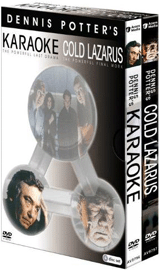 In these times of political coalitions, it’s intriguing to watch a unique television experiment which occurred in the late ’90s that has similar themes of co-operation. The writer Dennis Potter was near the end of his life with the knowledge that he would soon die from pancreatic cancer, when a minor race against time occurred to finish the scripts of an intertwined story which would be shown on alternate nights by BBC One and Channel 4.
In these times of political coalitions, it’s intriguing to watch a unique television experiment which occurred in the late ’90s that has similar themes of co-operation. The writer Dennis Potter was near the end of his life with the knowledge that he would soon die from pancreatic cancer, when a minor race against time occurred to finish the scripts of an intertwined story which would be shown on alternate nights by BBC One and Channel 4.
Potter always wrote in a heavily biographical way and it is fitting that his penultimate work, Karaoke, relies on such similar stylistic flairs with which he had made his name. A successful television drama writer, Daniel Feeld (Albert Finney), begins to hear lines of dialogue from a new drama that he is writing in the mouths of strangers on the street and in restaurants. His literary agents Ben Baglin (Roy Hudd, saddled with an unnecessary tic of spoonerisms) and Anna Griffiths (Anna Chancellor) are convinced they are merely figments of his over-active imagination, fueled by severe alcohol and tobacco dependency. But when the potential of the murder of a leading character in the piece begins to chime with real life, the stakes are suddenly raised.
Cold Lazarus turns proceedings entirely on their head, whereby we are transplanted nearly 400 years into the future where a shady group of cryogenic scientists, funded by a pharmaceutical tycoon, begin work on reviving the mind of a author from the past in order to broadcast his “thoughts” in a televisual way. The subject is – of course – Daniel Feeld.
Renny Rye helms both pieces (and managed to broker a deal with the two broadcasters in question that threatened to scotch the whole enterprise) and brings a delicacy to the scripts that enable both actors and author to truly shine, much in the way he did with the children’s classic The Box of Delights from the 1980’s and it would be anathema for Potter’s final swansong to be in any other hands. The sci-fi setting of Cold Lazarus acts as the perfect counterpoint to the drudgery of late 20th century London. At nearly six hours, it’s quite a mammoth undertaking which nowadays would be probably concertinaed into half the that time, but allowed to breathe it’s an experience well worth taking.
![]()
Released on DVD on 6th September 2010 by Acorn Media.

